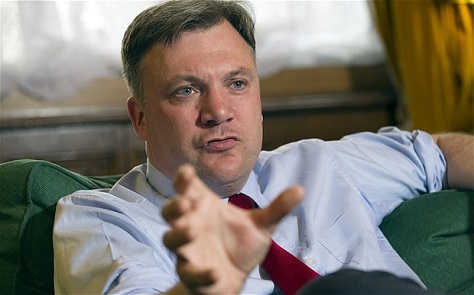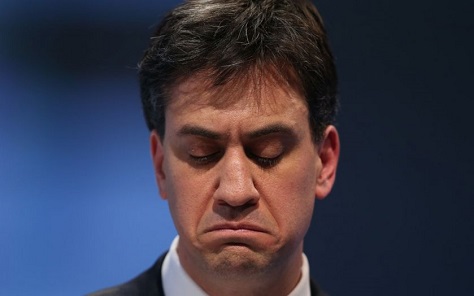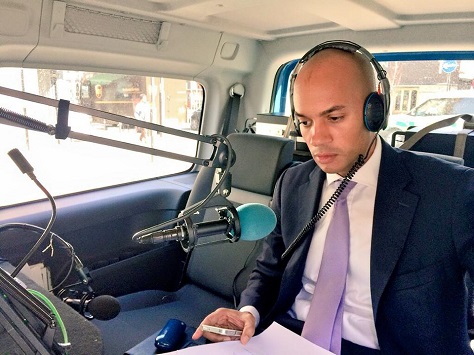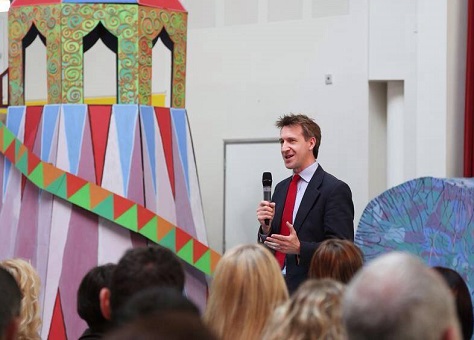It’s been a massively disappointing night for the Labour Party.![]()
English voters didn’t swing en masse to Ed Miliband. It certainly seems like southern voters stuck with the Conservatives and northern voters turned to the United Kingdom Independence Party (UKIP). Leftist voters turned to the Green Party, which seems set to triple its national support.
Scottish voters abandoned Labour outright, swinging massively to the pro-independence Scottish National Party (SNP).
* * * * *
RELATED: Live blog — UK election results
* * * * *
It’s the kind of wipeout that will demand Miliband’s resignation — even before he’s delivered an address and even before the British media has declared a winner. It may not happen tonight, it may not happen tomorrow, but it will happen soon.
Labour’s top officials will wake up on May 8 trying to figure out just how in the span of 18 months, the Tories whittled down a 10-point Labour lead in polls. Despite only tepid GDP growth and five years of budget cuts, voters failed to warm to Ed Miliband’s leadership. In the span of months, Labour saw ‘fortress Scotland’ obliterated by the SNP. In the span of days, Labour saw a plausible, if narrow, lead nationally evaporate.
Plenty of Labour officials will be saying that they chose the wrong Miliband brother — and that the one who could have won the 2015 general election was instead sitting in New York City running an NGO after Ed Miliband nipped past him in the 2010 leadership race on the strength of the votes of labour unions.
Allies of former prime minister Tony Blair will be quick to say ‘I told you so,’ blaming Miliband’s poor showing on the fact that he distanced himself from the Blairite ‘New Labour’ legacy that positioned the center-left Labour as a moderate, market-friendly party of government. Instead of gimmicky policies that would institute a ‘mansion tax’ on properties worth more than £2 million or the promise to introduce a £8 minimum wage by 2019 — and unveiling an eight-foot-tall stone monolith in the final weekend of the campaign inscribed with his pledges — Miliband should have projected Labour as a competent party with the ability to run government more smoothly and more compassionately than the Conservatives.
Leftists will argue that Miliband should not have agreed with prime minister David Cameron’s central premise that the most important task for the next government is reducing the budget deficit, currently at a level of 5% of GDP, and that the SNP’s leader and Scottish first minister Nicola Sturgeon emerged, instead of Miliband, as the clearest contrast to the ‘austerity’ agenda of the Cameron government.
In any event, Labour will now have to choose a leader through the second half of the Cameron era, and it will have several thoughtful figures from which to choose.
Andy Burnham
Burnham is probably the early leader to replace Miliband, though he’s certainly no lock. A member of parliament since 2001, the 45-year-old Burnham rose quickly up the ministerial ranks under former prime minister Gordon Brown, serving first as chief secretary to the treasury, then culture and sports secretary and finally as health secretary, with oversight over the country’s public-sector National Health Service. Since 2011, Burnham has served as the shadow health secretary. Burnham finished fourth in the 2010 Labour leadership contest, narrowly trailing Ed Balls.
With his experience as health secretary, Burnham would have credibility to attack any future Tory shortfalls with respect to the NHS. He easily has more charisma than Ed Miliband, he has the ability to bring personal experiences to policy proposals, and he is a more convincing potential prime minister than the self-admitted geeky Miliband. If Labour members determine that its party is too London-based and not close enough to the values of the working class, Burnham’s background will boost him — he’s from a working-class family from near Liverpool.
Yvette Cooper
The Scottish-born Cooper, age 46, could become the first female leader of the Labour Party. Married to Balls, the shadow chancellor, Cooper has been an MP since 1997 from northern England and, like Burnham, her ministerial career took off in the Brown government. Like Burnham, she rose quickly through the ranks from housing and planning minister to chief secretary to the treasury and, finally, work and pensions secretary. In opposition, Cooper has served as shadow home secretary.
Though it was her husband who ran for the Labour leadership in 2010, Cooper is now viewed as the likelier candidate in 2015 because of her poise and performance as shadow home secretary. For example, she’s been a champion for women’s rights, pushing for anti-stalking legislation and for a new office for domestic violence. Like Burnham, she’s viewed as a more plausible future prime minister than either Miliband or Balls.
Chuka Umunna
The London-born Umunna, the son of a Nigerian migrant, is widely talked up as the face of Labour’s future. Just 36 years old and an MP since only 2010, there’s some question whether Umunna, currently the shadow secretary for business and innovation, can make the leap to the leadership in 2015. He’s never served in government and he’s never even served in the House of Commons when Labour was in power.
Nevertheless, his multicultural background, movie-star good looks and capable political skills have made him a rising Labour star. If he goes for the Labour leadership, he could easily pose a threat — most especially if Blair and his allies line up behind Umunna. In the current campaign, he’s made overtures to reassure British business, and he’s called out the United Kingdom Independence Party (UKIP) as being infected with the ‘virus of racism.’ He’s moved steadily to the center, after beginning his career associated with the left-wing ‘Compass’ faction of the party.
Dan Jarvis
Jarvis, at age 42, is probably the least familiar potential major leadership contender — he’s a decorated veteran and special forces major who served as a paratrooper in Kosovo and later in Afghanistan and Iraq. He’s only been a member of parliament since 2011, and he’s only been a member of the shadow cabinet since October 2013, when he was appointed shadow secretary for justice.
If Labour does seek someone from outside its London elite, who can look beyond the M25, it can hardly find a better candidate than Jarvis. But he’s even less experienced than Umunna.
David Miliband
He narrowly lost the 2010 leadership contest, and he stepped down from parliament in 2013 to become the president of the New York-based International Rescue Committee.
Foreign secretary between 2007 and 2010, David Miliband was the frontrunner to take over the Labour Party as leader in the aftermath of the 2010 election, and his brother only very narrowly defeated him. In fact, in the odd tripartite process of selecting the Labour leader, David Miliband won more votes among Labour MPs and among regular party voters — his brother made up the difference with support from labour unions. He suffered from the sense that he erred in refusing to challenge Brown’s troubled leadership in 2008.
Humiliated, David Miliband found himself in an awkward position as a Labour backbencher in his brother’s caucus, and he gracefully retired to politics.
No one knows whether he is interested in another run for the leadership, especially after his brother’s failed run. Moreover, he would bring back much of the baggage of the Blair years, most especially the controversial decision to join the US invasion and occupation of Iraq. But he’s just 49 years old, and he would bring to the race the immediate implicit support of what remains of the Blairite wing of the Labour Party.
Ed Balls
 Photo credit to Paul Grover/The Telegraph.
Photo credit to Paul Grover/The Telegraph.
‘Pugnacious’ is the word that’s most often used to describe Balls, who finished third behind the Miliband brothers in the 2010 leadership race.
At age 48, Balls was first elected to the House of Commons in 2005 after serving for 15 years as an economic adviser to Gordon Brown, first as shadow chancellor and then as chancellor. In the Brown government, Balls served as secretary for children, schools and families, and he has been vocal in his criticism of Tory austerity as Miliband’s shadow chancellor.
As the leading voice of Labour’s economic policy in its failed 2015 election, and as a leading figure from the ‘Brownite’ wing of the party, Balls will almost certainly not be well-placed for the leadership, but he could still draw support from labour unions and other party members on the left.
That’s even if he survives in his own constituency of Morley and Outwood.






Looks like we can rule one out… I personally think they’d be foolish to not pick Chuka Umunna.